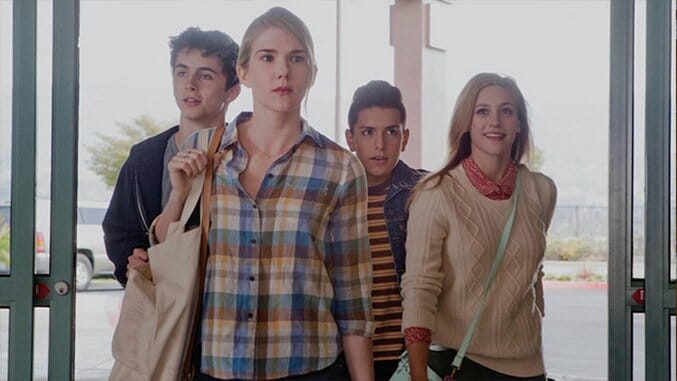
Early in Miss Stevens, Julia Hart’s exemplary character study, high school English teacher Rachel Stevens (Lily Rabe) lets loose a string of four-letter words following her tire blowing out while driving a car full of students. Immediately, she catches herself, apologizing to the dumbfounded teens. To them, she’s always been an authority figure, not a human being who reacts to everyday problems like car trouble.
Miss Stevens is essentially an entire film about navigating that thin line between being an adult and being a friend. After all, Rachel didn’t ask for this situation: She only reluctantly volunteered to drive these teens to the Young Dramatists State competition after multiple other teachers refused. But, for just a moment, she flipped the switch from teacher to peer—and, as she discovers, it’s much harder to flip it back. The mood between her and the students loosens; it doesn’t seem so strange to order a glass of wine at dinner, or to tell a slightly scandalous story about growing up. Besides, Rachel’s going through her own problems.
She may’ve started drinking too much, and she’s feeling isolated from her peers, but she isn’t the typical self-destructive teacher that’s appeared in dozens of indies like Half Nelson. She’s not an effortless sage either. Rabe’s performance fits Rachel well: She combines so many familiar character notes, but with such a delicate touch that she conveys both the melancholy of Rachel’s internal life and the outward dorkiness that makes high school English teachers so relatable to select students.
Her trip companions—Billy (Timothée Chalamet), Margot (Lili Reinhart), and Sam (Anthony Quintal)—are those students. Billy is a classical loner, albeit one who’s internalized the anti-social philosophies of Holden Caulfield a little bit too well. Margot is the class know-it-all, more comfortable organizing itineraries than making small talk with classmates. Sam is a drama-nerd who’s grappling with being out. Unfortunately, only Billy is really given the proper time to develop, but it’s fair to say that the script refutes obvious conclusions about the other two.
Billy isn’t altogether that different from most YA protagonists (think: a John Green character)—he’s intelligent, precocious, just a bit pretentious, and, as the film mentions multiple times, he also has a behavioral disorder. After an early scene where the traveling group discuss the ending of One Flew Over the Cuckoo’s Nest, the audience can almost intuit red flags going up that the film is treating mental illness like a bomb ready to detonate. Thankfully, Hart plays his character with subtlety and sobriety.
Billy can’t help that he’s connecting to Rachel throughout their time together. He thinks he’s found a kindred spirit, and beneath his Norman Bates glare he’s just another wounded kid who feels alone. Rachel, likewise, embraces an opportunity for intimacy, even if it’s with a teenager who she should be shepherding. Then again, she’s still making questionable decisions, like sleeping with wise but sleazy married men (a standout Rob Huebel).
These scenes between Rachel and Billy are what carry Miss Stevens, but elsewhere the film is a bit too on-the-nose. For example, it’s hard not to wish that the main competition at the center of this road trip was about anything other than dramatic monologues. After seeing a character recite passage after passage from Death of a Salesman in a previous scene, it’s hard not to view a subsequent, genuine emotional moment without the mechanical context of performance.
Regardless, Hart shows an immediate instinct for directing. This is her first time behind the camera after a writing credit on the Civil War revenge western, The Keeping Room, but she already seems to have mastered a fluid visual language and a telling sense for emotional composition. Together with her editors, Lee Haugen and Amy McGrath, Hart imbues the film with both a natural visual harmony, as well as the simplicity of a lasting message: There are no easy answers when dealing with the complexities of other human beings. Miss Stevens may offer no grand narrative revelations, but it doesn’t need to. Sometimes, four-letter words are enough.
Director: Julia Hart
Writer: Julia Hart, Jordan Horowitz
Starring: Lily Rabe, Timothée Chalamet, Rob Huebel, Anthony Quintal, Lili Reinhart, Oscar Nuñez
Release Date: September 16, 2016